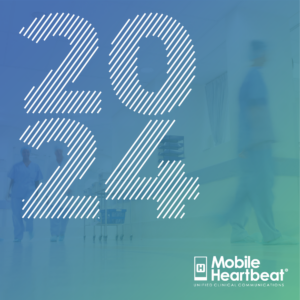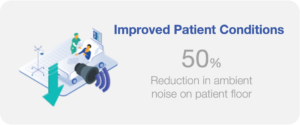As the year ends, we begin to reflect on the initiatives that defined 2021—flexibility and reliability during a pandemic, continued technological growth, and the continued successes of our customers and partners. In 2021, Mobile Heartbeat announced a new cloud-based collaboration platform, forged a partnership with Microsoft, and joined the Epic App Orchard marketplace, breaking barriers in the CC&C space.
1. A New Clinical Contender in the Cloud Space
In 2021, Mobile Heartbeat expanded our reach in the CC&C space to a new level: cloud-based clinical collaboration systems. The Banyan Platform is a cloud-native, modular platform, designed to be a customizable collaborative experience. The suite of applications on the platform provides total flexibility and puts power back in the hands of the healthcare organization. The modules, including high-quality voice calling, secure texting and more, create a collaborative network that leverages technology investments, streamlines existing workflows and boosts staff satisfaction.
2. Cloud-Based Clinical Calling
Banyan Voice, the first application offered on the platform, powers high-quality voice over internet protocol (VoIP) calling. Banyan Voice enables clinicians to reach their colleagues across multiple units, teams, facilities and even devices. By integrating with existing telephony systems, clinicians won’t have to worry about finding the right colleague.
Banyan Voice also contains a seamless, one-tap integration with the Epic EHR mobile apps Haiku and Rover that enable calling from within a patient record. Once the call is completed, the user is automatically routed back to the EHR, picking up where they left off.
While Banyan Voice is the first of these innovative cloud-based applications, we have a lot of exciting new capabilities in store for 2022 and beyond.
3. Advancing Clinical Alert Workflows
With new and disparate clinical systems going live all the time in hospitals, clinicians can feel overwhelmed by the number of devices, gadgets and applications they have to routinely check just to gather basic patient information. That’s why Mobile Heartbeat has teamed up with GE Healthcare and Ascom to streamline the delivery workflows of clinical and patient-based alerts. From new custom sounds that signal different alert types, to adding necessary context in telemetry alerts, this technology partnership is revolutionizing alerts to reduce fatigue, support clinical decision-making and return time to care.
4. Reinforcing Physician Privacy Protection
Even before the coronavirus pandemic began, healthcare organizations where dealing with a different, challenge: physician burnout. That problem is more widespread than ever before, and many organizations are still searching for ways to mitigate unnecessary stress and burden to help physicians.
Studies show that organizational changes can help reduce clinical burnout, and Mobile Heartbeat has implemented specific functionality to support this effort. Knowing the right person to contact, with on-call assignments and scheduling integrations, means providers who are off the clock won’t get calls at home. Additionally, personal phone number privacy features, such as call masking and custom caller ID, help reroute clinical callers to office phone numbers when a provider is neither working nor on call.
5. Breaking New Ground With Microsoft
This year, Mobile Heartbeat joined the Microsoft’s Cloud for Healthcare as the preferred clinical collaboration software provider. This new partnership has been fortified through the development of the Banyan Platform suite of applications on Microsoft Azure.
“The next generation of clinical communications and collaboration will require cloud computing, artificial intelligence, and healthcare data interoperability,” said David Rhew, chief medical officer at Microsoft. “Microsoft is pleased to partner with Mobile Heartbeat to apply these capabilities through Microsoft Cloud for Healthcare to expand real-time communications, enable seamless collaboration across the care continuum, and provide more precise and timely care.”
6. Complementing the Epic Ecosystem
In August, we announced that both MH-CURE and Banyan have both joined Epic’s App Orchard marketplace. We have made it our mission to develop capabilities that will complement the EHR, so that clinicians have a cohesive workflow experience and administrators can better leverage existing technology investments.
Meaningful integrations, like our seamless integrations with the EHR, help clinicians coordinate care more effectively across the healthcare enterprise. Access to real-time patient data provides clinicians the ability to communicate with context and accelerate critical decision-making. Care team collaboration has never been easier, or smoother, with the ability to launch communication capabilities directly within the EHR.
A critical aspect of the Mobile Heartbeat philosophy is interoperation with mission-critical systems to drive collaborative care and positive patient outcomes. Through the development of Banyan, and collaboration with Microsoft and Epic, these new products and capabilities have positioned Mobile Heartbeat to continue to drive innovation and uplift our customers in 2022.




